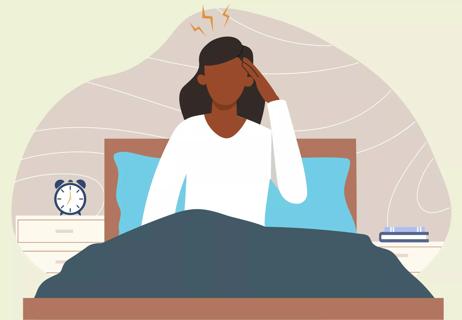Causes and treatments are wide-ranging

Dizziness isn’t a problem you should ignore. It can affect people differently, making you feel like you are spinning, light-headed, imbalanced, woozy, or it can cause a floating or rocking sensation. You may also experience nausea and visual problems, such as a decrease in focus, says vestibular therapist Janet Kucinic.
Advertisement
Cleveland Clinic is a non-profit academic medical center. Advertising on our site helps support our mission. We do not endorse non-Cleveland Clinic products or services. Policy
It’s important to tell your doctor if you feel these symptoms because it can be caused by a variety of issues. These issues can be anything from a problem in your inner ear, brain or neck, neurological or heart-related or can be caused by changes in your medication or dosage.
“The most important thing is to seek medical attention in order for your doctor to make appropriate assessments and diagnoses,” says Kucinic.
Your doctor may refer you to an ear, nose and throat specialist or a neurologist — or recommend further diagnostic tests, including an MRI and/or CT of the brain and/or neck. Cardiac tests or a vestibular test battery, a gold standard in assessing inner ear function, may also be necessary. In addition, if your doctor feels that it is more of a vestibular issue, vestibular PT may be recommended. Many times you may see a vestibular PT first who then may recommend additional consults if needed.
While dizziness can be caused by various factors, it can occur when the vestibular system — which controls balance and spatial orientation — becomes injured or damaged. There are a few different cases when this may occur.
One of the more common conditions of vestibular dysfunction is a condition called benign paroxysmal positional vertigo (BPPV). BPPV is when small crystals of calcium carbonate within one of the organs of the inner ear becomes detached and moves into another part of the inner ear. This dizziness usually lasts for less than a minute with positional movements such as bending, looking up, rolling over in bed or moving from a lying to sitting or sitting to lying position. If you experience an acute onset of symptoms including dizziness, nausea or vomiting, imbalance and visual challenges, this can be caused by vestibular neuritis. It may follow an upper respiratory infection or a gastrointestinal tract infection.
Advertisement
Lastly, if you experience symptoms that are similar to neuritis, it also can involve hearing loss and tinnitus due to a condition called vestibular labyrinthitis.
Less common types of dizziness can be caused by:
Other problems that can trigger dizziness are Menieres disease and migraines.
It’s also possible to experience dizziness related to the cervical spine, even if you don’t have neck pain.
“When there are joint and muscular impairments in the neck, especially in the upper cervical spine, this can cause altered proprioceptive input,” Kucinic says. “This, in turn, can cause dizziness.”
Cervical dysfunction, whether related to restricted upper cervical mechanics or increased tone in the cervical musculature, can lead to dizziness and/or a sense of imbalance. According to the Vestibular Disorder Association, the majority of patients improve with only treating the neck problems.
“Sometimes, initially, patients with an acute onset of dizziness need various medications to assist with lessening the symptoms,” says Kucinic.
These medications are called vestibular suppressants. In addition, there are anti-nausea medications to assist with nausea and vomiting that a patient may experience initially.
Your doctor may recommend vestibular rehabilitation therapy (VRT). VRT is an exercise-based program that’s designed to help reduce dizziness, imbalance, falls and vertigo.
Depending upon the causes of your dizziness, other treatments may include:
“The good news is that many people who suffer from dizziness can get some form of relief,” Kucinic says.
If dizziness is ever accompanied by any of the following, go to the emergency room:
Advertisement
Learn more about our editorial process.
Advertisement

While similar, one may make you feel lightheaded, while the other can cause a spinning sensation

Dizziness typically falls into two categories

Mornings can be hard enough without feeling dizzy, too

The short answer from a cardiologist

Understanding dizzy spells, what causes them and how to exercise if you get them

Options for sober social drinking are abundant, but be mindful about additives and triggers

Drowsiness is a side effect of inflammation, disrupted sleep and, sometimes, your allergy medicine

Eat fruits, vegetables, legumes, whole grains, lean proteins and healthy fats to help manage symptoms of this degenerative brain condition

If you’re feeling short of breath, sleep can be tough — propping yourself up or sleeping on your side may help

If you fear the unknown or find yourself needing reassurance often, you may identify with this attachment style

If you’re looking to boost your gut health, it’s better to get fiber from whole foods